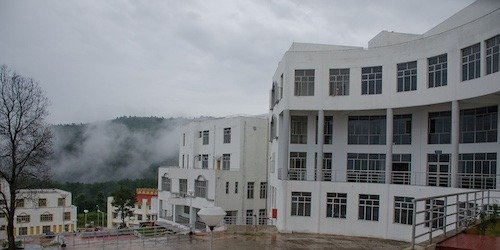The North Eastern Institute of Ayurveda and Homoeopathy (NEIAH) Shillong is at the center of controversy following the last year’s approval and launch of various MD courses in Homoeopathy, despite serious allegations of inadequate infrastructure and non-compliance with regulatory standards. Faculty members’ alleged push for personal promotion has raised questions about the institute’s ability to meet the academic and clinical needs of postgraduate education.
Hunger Strike Enters 6’th Day :
The ongoing turmoil at NEIAH Shillong took a dramatic turn as MD students entered the sixth day of their hunger strike on 1’st December 2024 demanding immediate attention to their grievances. The students’ demands center on three critical issues:
- Unpaid Stipends: MD (Homeopathy) students have not received stipends for over a year, despite fulfilling their clinical and academic responsibilities.
- Course Affiliation: Postgraduate courses have yet to be affiliated with the North Eastern Hill University (NEHU), leaving students uncertain about the legitimacy of their degrees.
- Corruption Allegations: Serious accusations have been made against the administration regarding mismanagement and misuse of funds, raising questions about accountability and transparency.
Allegations of Faculty Pressure
According to a whistleblower within the institute, some faculty members allegedly lobbied aggressively for the introduction of MD courses in Homoeopathy, primarily to enhance their own academic profiles. The whistleblower claims that this push was driven by personal ambition rather than the institute’s readiness to meet the rigorous requirements of postgraduate education. This alleged prioritization of self-interest has reportedly overshadowed the institute’s significant shortcomings in infrastructure and non-compliance with regulatory standards. This raises alarm that such actions compromise the quality of education and patient care at NEIAH Shillong.
Furthermore, some students, who wished to remain anonymous, have alleged that certain faculty members deliberately fail them in examinations, subjecting them to mental torture and trauma. These students claim that this practice is not only a means of personal vendetta but also an effort to satisfy the faculty’s ego. They further allege that students who dare to question the toxic environment or raise their voices against such practices are targeted and failed intentionally as a warning to others. This creates a culture of fear, where speaking out against injustice is met with severe academic repercussions. Such behavior, if proven true, points to a deeply unethical approach and a systematic effort to stifle dissent, undermining the very essence of medical education. Despite mounting pressure and student’s outrage, the administration has yet to take any tangible steps to address these alarming allegations.
Infrastructure and Resource Deficiencies
NEIAH Shillong, a key institution for promoting Ayurveda and Homoeopathy in the northeastern region, has faced scrutiny for its lack of essential facilities. According to critics, the institute is ill-equipped to handle the demands of MD programs in Homoeopathy, which require:
- State-of-the-Art Laboratories: Reports indicate that the existing labs lack modern equipment and adequate space for research.
- Specialized Clinical Training Units: MD students need access to well-equipped wards and teaching hospitals, which are allegedly poorly maintained at NEIAH.
- Qualified Teaching Staff: Institution partially or completely lacks Professors & other teaching faculty to run MD courses in Homoeopathy.
- Library and Research Resources: Postgraduate education requires access to extensive research materials, but NEIAH’s library is reportedly understocked and outdated.
Regulatory Non-Compliance?
The introduction of MD courses in Homoeopathy at NEIAH Shillong raises questions about whether the institute meets the stringent guidelines set by the Central Council of Research in Homoeopathy (CCRH) and other governing bodies. Critics allege that authorities may have overlooked or sidestepped these requirements under pressure from faculty and local influences.
The launch of MD courses at NEIAH Shillong has highlighted significant issues within the institution’s administration and planning. While the institute has the potential to play a pivotal role in advancing Ayurveda and Homoeopathy in northeastern India, stakeholders argue that it must first address its foundational gaps to ensure quality education and healthcare delivery. Only through transparent action and adherence to standards can NEIAH rebuild trust and fulfill its mission of promoting traditional medicine in the region.






